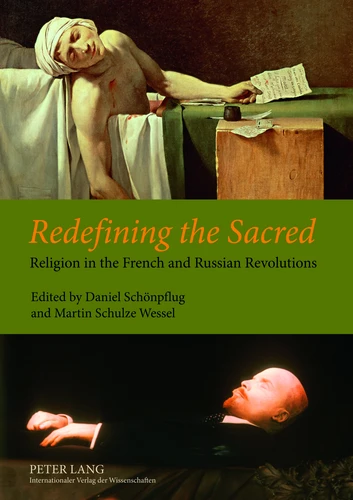Redefining the Sacred. Religion in the French and Russian Revolutions
Par : ,Formats :
- Paiement en ligne :
- Livraison à domicile ou en point Mondial Relay indisponible
- Retrait Click and Collect en magasin gratuit
- Nombre de pages226
- ISBN978-3-631-57218-4
- EAN9783631572184
- Date de parution01/05/2012
- ÉditeurPeter Lang
Résumé
The revolutions of 1789 and 1917 were defining moments for religious history in France, Russia, and even in Europe as a whole. Drawing on the self-portrayals of some of the most radical actors, historians have presented revolutionaries as enemies of the church, and men of the church either as counter-revolutionaries or as victims of revolution. Revolution and religion have appeared as antagonistic forces, representing the struggle of modernity against tradition.
Only recently have these conventional patterns of interpretation been questioned. Historians explore the religious origins of revolutions, look at clergymen and churches as revolutionary actors and analyze how revolutionary movements appropriate religious patterns of thought and behavior. In the French and in the Russian context, revolutions are seen as moments in which the sacred was redefined.
Only recently have these conventional patterns of interpretation been questioned. Historians explore the religious origins of revolutions, look at clergymen and churches as revolutionary actors and analyze how revolutionary movements appropriate religious patterns of thought and behavior. In the French and in the Russian context, revolutions are seen as moments in which the sacred was redefined.
The revolutions of 1789 and 1917 were defining moments for religious history in France, Russia, and even in Europe as a whole. Drawing on the self-portrayals of some of the most radical actors, historians have presented revolutionaries as enemies of the church, and men of the church either as counter-revolutionaries or as victims of revolution. Revolution and religion have appeared as antagonistic forces, representing the struggle of modernity against tradition.
Only recently have these conventional patterns of interpretation been questioned. Historians explore the religious origins of revolutions, look at clergymen and churches as revolutionary actors and analyze how revolutionary movements appropriate religious patterns of thought and behavior. In the French and in the Russian context, revolutions are seen as moments in which the sacred was redefined.
Only recently have these conventional patterns of interpretation been questioned. Historians explore the religious origins of revolutions, look at clergymen and churches as revolutionary actors and analyze how revolutionary movements appropriate religious patterns of thought and behavior. In the French and in the Russian context, revolutions are seen as moments in which the sacred was redefined.


